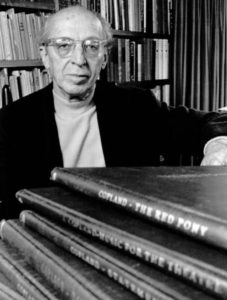Copland, Fanfare for the Common Man

American music can be difficult to define, especially when so much of our music has its roots elsewhere. Many American composers were born in other countries and immigrated here. Many went abroad to receive their training, soaking up primarily European traditions but sometimes Eastern or African influences as well. And, of course, many of the styles transplanted to America continued to adhere to the dictates of their country of origin.
So what makes a piece of music, or any work of art for that matter, American? Other countries have dealt with the same question. The rise of nationalist styles in the 19th century saw Russians struggling to be authentically Russian, and Czechs seeking a distinctly Czech sound. The same was true in many other countries. Most of them turned to their folk traditions, which mights stretch back centuries. But America’s folk traditions were mostly imported and tied to the various ethnicities of our immigrants.
Aaron Copland went to study composition in Paris in 1921. He became the first American student of Nadia Boulanger, who taught many of the leading 20th-century composers. Copland sought early on a way to write music that would be instantly recognized as American. Initially he looked to pop music and jazz, but concluded that imitations of jazz were too limiting. Beginning in the mid 1930s, Copland turned to what he called “imposed simplicity.” He wrote:
[A]n entirely new public for music had grown up around the radio and the phonograph. It made no sense to ignore them and to continue writing as if they did not exist. I felt that it was worth the effort to see if I couldn’t say what I had to say in the simplest possible terms.
Some of Copland’s most successful works belong to this period: El Salón México (1936), Billy the Kid (1938), Rodeo (1942), and Appalachian Spring (1944).
Fanfare for the Common Man was composed in 1942 in response to America’s entry into World War II. The title was prompted by a speech that year given by Vice President Henry Wallace in which he evoked the dawning of the “century of the common man.”



